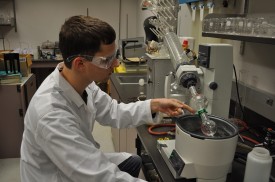Features Reporter
A college education is designed to offer students an opportunity to challenge their knowledge and pursue their professional dreams. For some people, this education leads them back to a college campus in hopes that they can inspire others. There is a certain level of dedication and passion necessary to work at CMU, and the Chemistry department is just one example of this.
The objective of each type of class in the department is to teach students to problem-solve and follow proper protocol for experiments. Reflecting on his choice to pursue a degree in chemistry, Professor David Weinberg said, “It was one of the first classes that broke away from memorization and following set equations or formulas.”
Even if a student’s major isn’t chemistry, these are important skills to learn in all aspects of education. Most students will have to spend some time in this department as they offer most of the science course requirements, such as environmental science, kinesiology, biology and of course, chemistry. Upper level classes include analytical, organic, physical and biochemistry focuses with the option to possibly minor or major in these concentrations.
There are limitless job possibilities with a Chemistry major or minor. For a major, there are paths in industries such as pharmaceutical, energy or chemical as a researcher or working in laboratories. A position as a consultant or working with public policies is also an option. Of course, students can continue their education to the doctoral or masters level, allowing them to also have the option to teach or work in patient law. A minor in chemistry is complimentary with a degree in environmental science, biology or engineering because of skills taught to be detailed and exact. The time at CMU offers the opportunity to pursue these options because of the research being done by undergraduates alongside the Chemistry professors.
These skills are taught by people who have big dreams and a lot of experience.
“I found that solving complex chemical problems required significant creativity and intuition based on chemical understanding,” Weinberg said.
Each Chemistry faculty member is actively conducting research. Professor James Ayers is currently studying reactions of the ozone with his concentration in physical and environmental chemistry, Professor Joe Richards synthesizes natural products, Professor Kim White works with biochemicals to find new compounds in myxobacteria and Tim D’Andrea focuses with analytical chemistry.
D’Andrea is currently working on a project revolving around beer, specifically why it tastes bitter. He uses his skills to understand the isohumulones chemicals that cause this bitter taste.
“I am excited about the research that we are doing, and it is absolutely fantastic to see students of all levels leading the way on challenging research projects,” said Weinberg.
His research works to understand solar fuels. His goal is to find new ways to convert carbon dioxide and electricity into fuels. The work is detailed, especially as it requires finding possibilities to convert certain bonds to be more suitable for petroleum and natural gas use as well as pharmaceutical. The research will be accessible to the public through posters and a presentation for the American Chemical Society’s meeting in the spring. The projects are supported by two Faculty Professional Development Grants from CMU.
These are just a small measure of the projects that the chemistry department is working on.
“We are very active in research on a variety of fronts,” Weinberg said.
This research would not be possible without a research assistant. As a new semester is beginning, there are openings to apply, with paid positions available. Students can apply for a work study grant through the Financial Aid Office to be fully funded as an assistant.
The Chemistry department will be showcasing their talent at the Student Showcase. This is the best way to understand the research and projects happening within the department. Another avenue is to join the Chemistry Club. The group is actively involved in the community through presentations at the John McConnell Math and Science Center. On campus, they work hard to give demonstrations as well as sessions on internship opportunities.
“I love finding new ways to help students understand chemistry, and I always enjoy hearing about my students’ lives, hopes and dreams,” Weinberg said. “I hope that I can help them harness their skills, creativity, and passion to achieve their goals.”
Even if a student isn’t a chemistry major, Weinberg said that “all students can be successful if they work hard and are willing to ask questions.”

Recent Comments